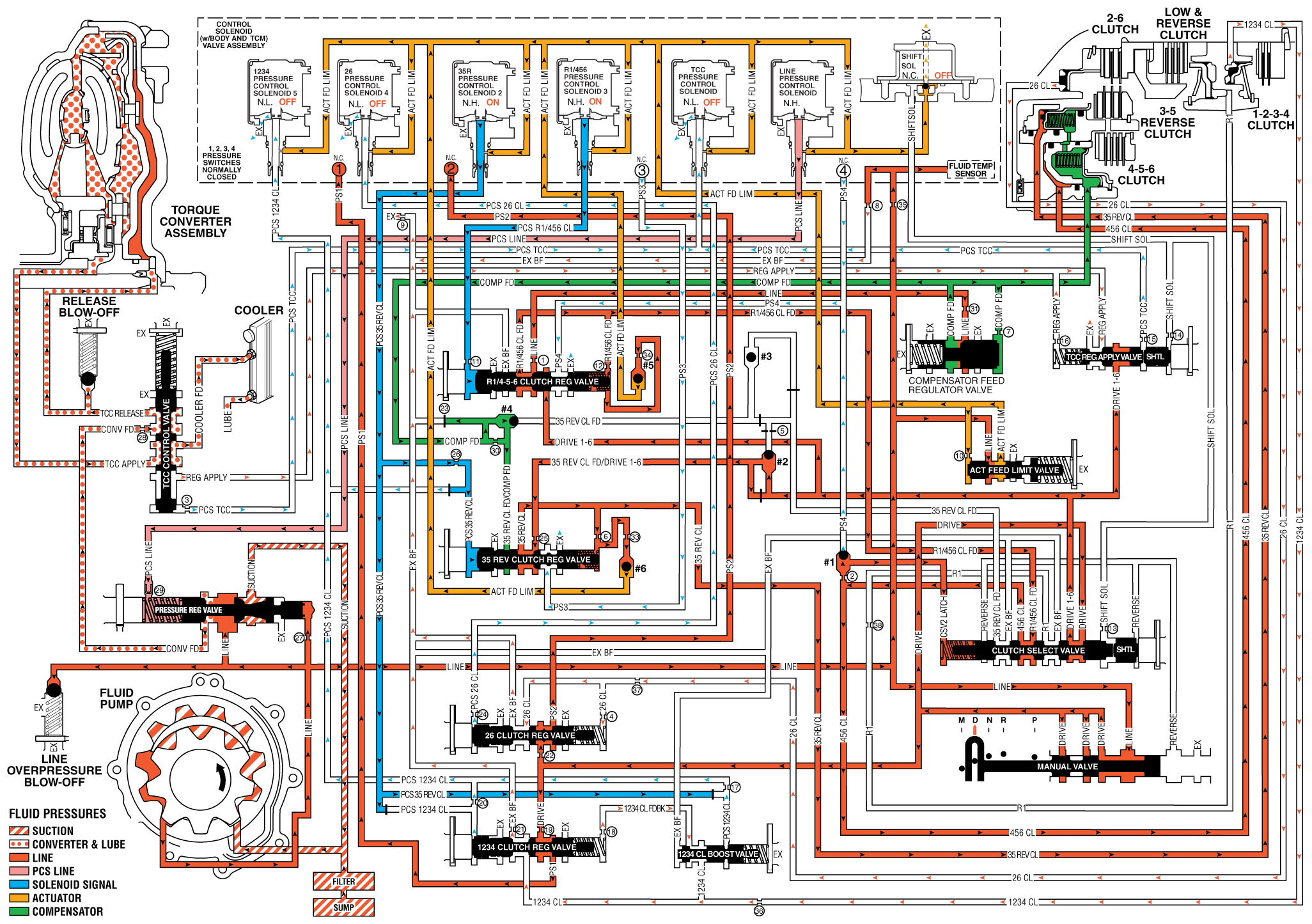If the transmission is in 4th, 5th or 6th gear during a transmission electrical component failure, the transmission will default to 5th gear. All solenoids will default to their normal state. If the torque converter clutch was applied, it will release. The transmission will stay in 5th gear default range until the ignition has been turned off or transmission shifted to reverse. When the vehicle is restarted, and shifted back into drive, the transmission will then operate in the 3rd gear default range. This default action will enable the vehicle to be safely driven to a service center.
3-5 Reverse Clutch Applies
35R Pressure Control Solenoid 2
The 35R pressure control solenoid 2 defaults to ON, allowing actuator feed fluid to enter the pressure control solenoid (PCS) 35 reverse clutch fluid circuit. PCS 35 reverse clutch fluid is routed through orifice #26 and then to the 3-5 reverse clutch regulator valve.
3-5 Reverse Clutch Regulator Valve
PCS 35 reverse clutch fluid moves the 3-5 reverse clutch regulator valve against 3-5 reverse clutch regulator valve spring force and 35 reverse clutch feedback fluid. This allows 35 reverse feed to pass through orifice #25 to the valve and enter the 35 reverse clutch circuit. The 35 reverse clutch fluid is then routed to the 3-5 reverse clutch. When the 3-5 reverse clutch regulator valve is in this position, PS2 fluid from the pressure switch 3 exhausts through the valve allowing the switch to close.
3-5 Reverse Clutch
The 3-5 reverse clutch fluid enters the 3-5 reverse/456 clutch housing to move the piston against spring force to apply the 3-5 reverse clutch plates.
1-2-3-4 Clutch Releases or 2-6 Clutch Releases
1234 Pressure Control Solenoid 5
If the transmission was in 4th gear when an electrical condition commands a protection mode, the 1234 pressure control solenoid 5 defaults to the OFF position, allowing PCS 1234 clutch fluid from the 1-2-3-4 clutch, the 1-2-3-4 clutch regulator valve and 1-2-3-4 clutch boost valve to exhaust.
26 Pressure Control Solenoid 4
If the transmission was in 6th gear when an electrical condition commands a protection mode, the 26 pressure control solenoid 4 defaults to the OFF position, allowing PCS 26 clutch fluid from the 2-6 clutch regulator valve, and the 2-6 clutch to exhaust.
Torque Converter Clutch Releases
TCC Pressure Control Solenoid
The torque converter clutch (TCC) pressure control solenoid will default to it's normal state, OFF. PCS TCC fluid will exhaust from the TCC control valve, and spring force will shuttle the valve to the off position. TCC apply fluid will then be routed to the cooler, and TCC release fluid will be routed to the torque converter for complete TCC release.
1234 Clutch Regulator Valve
The 1234 clutch regulator valve spring force moves the valve to allow drive fluid to enter the PS1 fluid circuit which opens PS1 switch. The 1234 clutch fluid passes through the 1234 clutch regulator valve, through orifice #21 and enters the exhaust backfill circuit.
Drive Range, Fifth Gear Default

